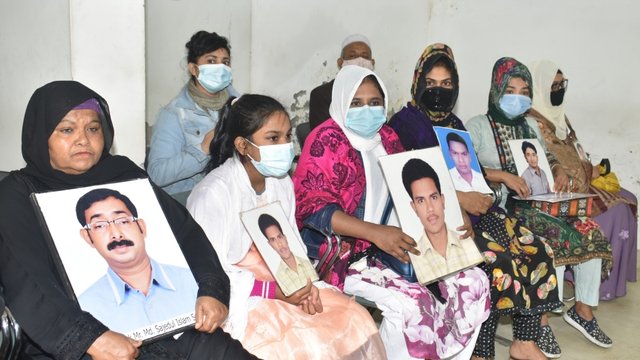
Enforced disappearances have emerged as one of the most severe forms of human rights violations in Bangladesh. Despite being strictly prohibited under international law, these acts have been systematically carried out with state support, creating a dark chapter in the nation's recent history. Enforced disappearances, as defined by the United Nations, involve the secret abduction of individuals by state authorities or their agents, leaving them in a legal limbo where their fate remains unknown. This practice terrorises the individuals involved and instils widespread fear within society. International law mandates strict punishment for those involved in such heinous acts, recognising that these violations are often the hallmark of oppressive regimes. The scale and severity of enforced disappearances in Bangladesh's recent history have been compared to some of the darkest periods in history.
A Legacy of Human Rights Violations
Since its independence, Bangladesh has experienced numerous human rights violations. The Awami League government, which came to power in 2009 with promises to curb such abuses by law enforcement agencies, has instead presided over a regime characterised by rampant extrajudicial killings, enforced disappearances, and abductions. This has transformed Bangladesh into a bleak landscape where the rule of law has been systematically undermined, drawing severe criticism from both national and international human rights organisations.
The Systematic Undermining of Constitutional Rights
The Constitution of Bangladesh stipulates the protection of its citizens' lives, yet under the Awami League's rule, the implementation of constitutional and international human rights standards has severely deteriorated. State-sponsored disappearances, murders, and mass killings became everyday occurrences, with law enforcement agencies being used as tools to consolidate power over the last 16 years. The politicisation and corruption within all state institutions have reached such heights that these bodies no longer function within the legal framework but serve the ruling elite's interests. The Awami League's tenure has thus been marked by a consistent and severe violation of human rights, facilitated by the abuse of power and the systematic use of state machinery to oppress political opponents and dissenting voices.
The Role of Law Enforcement in Enforced Disappearances
Various human rights organisations, media outlets, and families of the victims have frequently accused Bangladesh’s law enforcement agencies of being directly involved in these enforced disappearances. The regime of Sheikh Hasina has been implicated in these crimes, with allegations that abducted individuals were held in secret prisons like the infamous 'Aynaghar' (House of Mirrors), known for its inhumane conditions and lack of due process. Some have even managed to return from these secret detentions, shedding light on the grim realities they faced. According to the prominent human rights organisation 'Odhikar,' the phenomenon of enforced disappearances began in 2009, coinciding with the Awami League’s return to power, and has continued to escalate ever since. By 2023, there had been 2,699 extrajudicial killings, with 677 individuals forcibly disappeared during this period, according to Odhikar's data.
The Impact on Families and Society
The insidious nature of enforced disappearances lies in their ambiguity—victims vanish without a trace, leaving their families in a perpetual state of uncertainty and despair. The families of the disappeared endure not only the emotional trauma of losing a loved one but also the economic hardships that follow. For instance, the family of Ilias Ali, a prominent opposition figure, clung to the hope that he would one day return, believing that he might be released from Sheikh Hasina’s secret prisons. Law enforcement agencies, under the direct orders of the Awami regime, employed enforced disappearances as a method of control, ensuring that dissent was stifled and opposition voices were silenced.
The Need for Justice and Accountability
The United Nations Convention on Enforced Disappearances emphasises the importance of investigating, prosecuting, and punishing those responsible for these atrocities. However, implementing these processes depends heavily on the willingness of signatory states to uphold their commitments. The global community, including international human rights organisations and policymakers, holds states accountable for their actions. In Bangladesh, under the Awami League’s rule, impartial investigations into most cases of enforced disappearances were notably absent. Instead, through so-called departmental inquiries, law enforcement agencies legitimised these violations under the directive of the previous authoritarian government. Nevertheless, it is not too late to seek justice. A neutral investigation commission must be established under the current interim government to thoroughly investigate these past incidents and bring the perpetrators to justice. Failure to address these crimes could lead to their recurrence under any future government.
The Path Forward
A government that does not focus on good governance and human rights cannot hope to provide any form of redress. The Hasina government exemplified this truth. To protect human rights, there is an urgent need for a more accountable democracy, along with the reform of fundamental institutions within the democratic framework. Additionally, enforced disappearances must be legally recognised as a criminal offence, with measures in place to protect victims and provide remedies for these atrocities. The struggle against state-sponsored disappearances, murders, and oppression must continue, and the perpetrators must be held accountable to ensure that they are not granted impunity under any circumstances. This is the hope and demand of those who have suffered under this dark chapter of Bangladesh’s history.
Thank you, friend!


I'm @steem.history, who is steem witness.
Thank you for witnessvoting for me.
please click it!
(Go to https://steemit.com/~witnesses and type fbslo at the bottom of the page)
The weight is reduced because of the lack of Voting Power. If you vote for me as a witness, you can get my little vote.
Downvoting a post can decrease pending rewards and make it less visible. Common reasons:
Submit
Upvoted! Thank you for supporting witness @jswit.
Downvoting a post can decrease pending rewards and make it less visible. Common reasons:
Submit